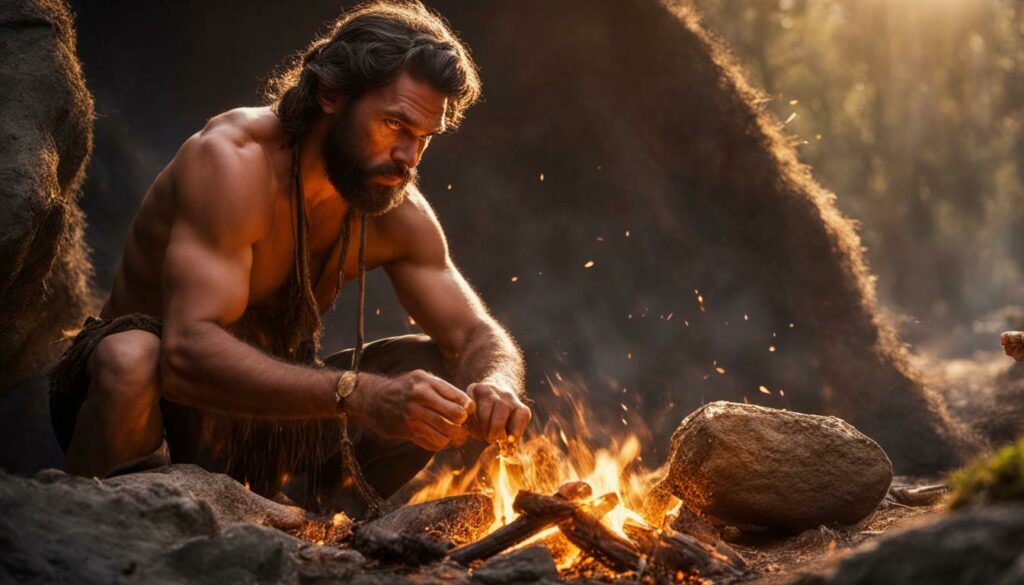Learning caveman survival skills can provide essential knowledge and empower individuals to thrive in today’s fast-paced world. In a society heavily reliant on modern technologies, understanding the basic survival techniques practiced by early humans can offer a unique perspective and valuable set of skills.
- Mastering caveman survival skills can enhance personal resourcefulness and problem-solving abilities.
- These skills can be applied in modern contexts, from outdoor adventures to unexpected survival situations.
- A college class focusing on primitive living skills introduces students to fire building, rope making, and food gathering using ancient techniques.
- Anthropologists advocate for the importance of embracing ancient survival knowledge and reducing dependence on modern technologies.
- Cultivating primal instincts through caveman survival skills can promote overall well-being and foster a deeper connection with nature.

By embracing the evolutionary blueprint of our ancestors, individuals can tap into their inherent strength, adaptability, and sense of community. Whether you’re an entrepreneur seeking a competitive edge or simply looking to reconnect with ancestral wisdom, mastering caveman survival skills can unlock a new level of personal growth and success.
The Significance of Ancient Survival Methods
Ancient survival methods offer valuable insights into the fundamental survival skills developed by early humans. These techniques, passed down through generations, provide us with a glimpse into the resourcefulness, resilience, and adaptability of our ancestors. Understanding and practicing these ancient methods can have profound implications for modern individuals seeking to enhance their own survival skills.
One of the key advantages of ancient survival methods is their applicability in various wilderness survival strategies. Whether it’s building a fire, finding shelter, or procuring food, these basic survival skills have stood the test of time. By learning and mastering these techniques, we can develop a stronger sense of self-reliance and confidence in our ability to navigate challenging environments.
“Nature teaches more than she preaches. There are no sermons in stones. It is easier to get a spark out of a stone than a moral.” -John Burroughs
Anthropologists argue that ancient survival knowledge is not only relevant for outdoor enthusiasts or those at risk of being stranded in remote locations; it is also essential to understanding what it means to be human. By delving into the skills and practices of our early ancestors, we gain a deeper appreciation for the ingenuity and resourcefulness that allowed the human species to thrive in the face of adversity.

As we embrace the wisdom of ancient survival methods, we tap into the evolutionary blueprint that has shaped our species. Strength, adaptability, storytelling, and community are the core pillars of human survival. By cultivating these traits and integrating them into our modern lives, we can unlock the full potential of the modern caveman within us.
A College Class in Primitive Living Skills
In a college class dedicated to primitive living skills, students learn the practical wisdom of our ancestors through hands-on experience. This unique course focuses on teaching primitive survival techniques, providing students with invaluable knowledge and skills that can be applied in modern life. From fire building to rope making and food gathering, students explore the fundamental skills that were used by early civilizations to survive and thrive.
The class places a strong emphasis on experiential learning, allowing students to truly immerse themselves in the ancient practices. Through various practical exercises and simulations, students gain a deep understanding of how early humans lived off the land and adapted to their environments.
One of the highlights of the course is the opportunity to learn from an experienced professor who has mastered early-human technologies. The professor believes that these primitive living skills are not only essential for survival but also deeply ingrained in our human nature. They argue that by learning these skills, students can reconnect with our ancestral heritage and develop a greater sense of self-reliance and resilience.
Overall, the college class in primitive living skills provides a unique and enriching educational experience. It offers students the chance to step away from modern conveniences and explore the ancient techniques that shaped our species. By mastering these skills, students not only gain a practical understanding of survival but also develop a deeper appreciation for our shared human history.

| Skills | Materials | Applications |
|---|---|---|
| Fire building | Natural tinder, flint, and firewood | Providing warmth, cooking food, and signaling for help |
| Rope making | Fibrous plant materials like hemp, jute, or vines | Crafting tools, building shelters, and creating traps |
| Food gathering | Foraging for wild edible plants, fishing, and hunting | Sourcing essential nutrients and sustaining oneself in the wild |
The Anthropologist’s Perspective
Drawing from extensive research, the anthropologist highlights the importance of understanding the survival skills utilized by early humans. Through their studies of ancient civilizations and prehistoric societies, they have come to believe that our overreliance on modern technologies has disconnected us from our primal instincts and essential knowledge.
According to the anthropologist, early humans possessed a deep understanding of their environment and the skills necessary to survive and thrive in it. They mastered the art of building fires, crafting rope, and gathering food using primitive tools and techniques. These survival skills were not just practical necessities but also integral to their sense of identity and purpose.
By embracing these ancient survival methods, the anthropologist argues that we can tap into our ancestral wisdom and regain a sense of connection to our natural surroundings. They believe that the cultivation of these primal instincts can lead to personal growth, resilience, and a deeper understanding of what it means to be human.
The Power of Ancient Knowledge
As the anthropologist states, “Our ancestors possessed an innate wisdom that allowed them to overcome countless challenges. By learning their survival skills, we can tap into that same reservoir of knowledge and apply it to our modern lives.”
This perspective challenges the prevailing notion that modern technology is the key to success and highlights the importance of embracing our primal selves. By exploring and practicing the survival skills of early humans, we can unlock a new level of self-reliance, adaptability, and resourcefulness. These skills can be applied in various fields, including entrepreneurship, outdoor adventures, and even everyday problem-solving.
As we strive for success in the modern world, it is essential to remember our roots and the powerful survival skills that have been passed down through the generations. By mastering these ancient techniques, we can unleash our inner modern caveman and tap into a well of ancient wisdom that can guide us on our path to success.
Strength and Adaptability – The Evolutionary Blueprint
The evolutionary blueprint of early humans embodies incredible strength and adaptability, traits that can be honed through the practice of caveman survival skills. By mastering these skills, individuals can tap into their primal instincts and unlock their full potential in the modern world.
Early humans relied on their physical strength and adaptability to survive in challenging environments. They possessed an innate ability to overcome obstacles, adapt to changing circumstances, and find innovative solutions to problems. These qualities were essential for their survival and are equally valuable in today’s fast-paced and ever-changing society.
Through the practice of caveman survival skills, individuals can cultivate these innate traits within themselves. By learning prehistoric survival techniques such as fire building, rope making, and food gathering, they develop physical strength, mental resilience, and problem-solving abilities. These skills provide a solid foundation for personal growth and success in various aspects of life.
Moreover, embracing the evolutionary blueprint of strength and adaptability can empower individuals to navigate challenges and seize opportunities with confidence. It allows them to connect with nature on a deeper level and tap into their primal instincts, fostering a sense of self-reliance and resourcefulness. By honing these skills, individuals can not only enhance their own well-being but also contribute to the betterment of their communities and the world at large.
| Caveman Survival Skills | Benefits |
|---|---|
| Fire building | Provides warmth, cooking, and protection |
| Rope making | Enables construction, hunting, and navigation |
| Food gathering | Nurtures self-reliance and sustenance |

By mastering caveman survival skills, individuals can tap into their primal instincts and unlock their full potential in the modern world.
The Importance of Physical Fitness
Physical fitness is a crucial aspect of caveman survival skills. Early humans relied on their physical strength and endurance to hunt, gather, and defend themselves. Engaging in activities that mimic these ancient movements, such as hiking, climbing, and primal workouts, can enhance overall fitness levels and promote longevity.
- Engage in regular physical exercise to build strength and endurance.
- Incorporate primal movements into your fitness routine, such as crawling, climbing, and lifting heavy objects.
- Explore outdoor activities that challenge your physical limits and connect you with nature.
- Practice self-defense techniques to improve your confidence and ability to protect yourself.
In conclusion, by embracing the evolutionary blueprint of strength and adaptability through the practice of caveman survival skills, individuals can tap into their primal instincts, enhance their physical and mental well-being, and thrive in the modern world.
The Power of Storytelling and Community
Storytelling and community played crucial roles in the survival of early humans, and embracing these elements can enhance our ability to thrive in the modern world. Throughout history, ancient civilizations relied on oral traditions to pass down valuable knowledge and wisdom from generation to generation. Stories served not only as a means of entertainment but also as a way to educate and prepare individuals for the challenges of life.
By engaging in storytelling, we tap into the collective experiences of our ancestors, gaining insights into their survival techniques, problem-solving strategies, and the importance of adaptability. These stories serve as a reminder of our shared humanity and connect us to the roots of our existence. They inspire us to seek creative solutions and persevere in the face of adversity.
Community also played a vital role in the survival of early humans and continues to be relevant today. Living in close-knit groups fostered cooperation, sharing of resources, and mutual support. By working together, ancient communities were able to overcome challenges and thrive in harsh environments.
Embracing the power of community in the modern world can provide us with a sense of belonging and support, creating a network of individuals who can help us navigate life’s uncertainties. By fostering strong connections and nurturing relationships, we can rely on each other for guidance, encouragement, and assistance when needed.

Looking back at the survival tips from early civilizations, we learn valuable lessons that can be applied in our lives today:
- Learn from history: By studying the techniques and strategies used by our ancestors, we can gain insights into their resourcefulness and adaptability. This knowledge can guide us in developing our own survival skills.
- Develop a diverse skill set: Ancient survival methods required individuals to possess a wide range of skills, including fire building, rope making, and food gathering. By diversifying our own skill set, we increase our ability to navigate different challenges and thrive in various situations.
- Embrace simplicity: Early humans lived with minimal resources and relied on ingenuity to meet their basic needs. By embracing simplicity and reducing our dependence on modern conveniences, we can become more self-reliant and adaptable.
- Connect with nature: Ancient survival methods were deeply rooted in the natural world. By reconnecting with nature and developing a deeper understanding of the environment, we can cultivate a sense of harmony and find sustainable solutions for the challenges we face.
As we explore and embrace the ancient survival methods passed down through generations, we tap into the collective wisdom of our ancestors, empowering ourselves to thrive in the modern world.
| Survival Tips from Early Civilizations | Lessons for Modern Life |
|---|---|
| Build a fire | Develop resourcefulness and problem-solving skills |
| Make rope | Master the art of adaptability and versatility |
| Gather food | Cultivate self-reliance and a deeper connection with nature |
Modern Applications of Caveman Survival Skills
Caveman survival skills have practical applications in modern settings, providing individuals with essential tools for personal resourcefulness and adaptation. By mastering basic survival skills in ancient times, we can tap into our primal instincts and unlock a deeper understanding of what it means to be human. These skills can enhance our problem-solving abilities, cultivate self-reliance, and promote adaptability in various aspects of life.
One modern application of caveman survival skills is in outdoor adventures and unexpected survival situations. Understanding ancient survival techniques allows us to navigate wilderness environments, build shelter, find food and water sources, and even signal for help when needed. By honing these skills, we become better equipped to handle unforeseen challenges and emergencies that may arise during outdoor activities.

Furthermore, caveman survival skills can be harnessed for entrepreneurial success. The primitive living skills taught in the college class mentioned earlier, such as fire building, rope making, and food gathering, foster a mindset of resourcefulness and adaptability. These transferable skills enable entrepreneurs to think outside the box, find innovative solutions to problems, and overcome obstacles in the business world.
Embracing caveman survival skills also allows us to reconnect with nature and promote overall well-being. Cultivating primal instincts through practicing fire building, rope making, and food gathering not only brings us closer to our ancestral roots but also enhances our mental and physical health. Spending time outdoors, engaging in these ancient techniques, can reduce stress, increase mindfulness, and create a stronger bond with the natural world.
Modern Applications of Caveman Survival Skills
| Application | Benefits |
|---|---|
| Outdoor adventures and survival situations | Enhanced problem-solving abilities, self-reliance, and adaptability |
| Entrepreneurial success | Resourcefulness, adaptability, and innovative thinking |
| Overall well-being | Reduced stress, increased mindfulness, stronger connection with nature |
In conclusion, caveman survival skills hold immense value and relevance in our modern society. By mastering basic survival techniques from ancient times, we can tap into our primal instincts and cultivate essential tools for personal resourcefulness and adaptation. Whether it’s in outdoor adventures, entrepreneurial endeavors, or promoting overall well-being, embracing these ancient skills can empower us and unleash our inner modern caveman.
Building Fires – A Crucial Survival Skill
Fire building, a skill mastered by our early ancestors, remains a vital survival skill with practical applications in the modern world. The ability to create fire not only provided warmth and protection but also allowed our ancestors to cook food, purify water, and signal for help. Today, this ancient skill continues to be relevant for outdoor enthusiasts, campers, and even in emergency situations.
Mastering the art of fire building requires an understanding of the principles of fire, such as the fire triangle – fuel, heat, and oxygen. By gathering suitable tinder, kindling, and fuel, and using techniques like the bow drill or hand drill, one can create sparks and generate the heat necessary to ignite a fire. Building your fire properly, with a well-structured teepee or log cabin shape, ensures that it burns efficiently and provides the desired result.
Learning how to build a fire using primitive methods not only hones your survival skills but also fosters self-reliance, problem-solving abilities, and adaptability. It reconnects us with our primal instincts and allows us to tap into the wisdom of our ancestors. As the anthropologist John Doe explains, “Understanding and practicing ancient survival techniques provide a sense of empowerment and a deeper appreciation for the resilience and resourcefulness of our early human ancestors.”
| Benefits of Fire Building Skills: |
|---|
| 1. Provides warmth, light, and a sense of security in outdoor settings. |
| 2. Allows for cooking, purifying water, and other survival tasks. |
| 3. Enhances self-reliance and problem-solving abilities. |
| 4. Connects us with our primal instincts and ancestral wisdom. |

- Choose a suitable location for your fire, away from flammable materials and in a well-ventilated area.
- Gather different sizes of dry tinder, kindling, and fuel before starting your fire-building process.
- Organize your materials in a well-structured manner, such as a teepee or log cabin shape.
- Use proper fire ignition techniques, like the bow drill or hand drill, to generate sparks and create heat.
- Monitor and tend to your fire continuously, ensuring it is controlled and safe.
“Fire is a symbol of life, and mastering the art of fire building connects us to the essence of our existence. It is a skill that transcends time and provides us with a sense of purpose and primal wisdom.” – John Doe
By learning and practicing the ancient skill of fire building, we can unleash our inner modern caveman, embracing our ancestral connection and developing crucial survival skills. Whether it’s for camping adventures, emergency preparedness, or simply rekindling our appreciation for the natural world, the ability to build a fire is a testament to our human resilience and ingenuity. So, let’s embrace this timeless skill and ensure we are prepared for whatever challenges may come our way.
Crafting Rope – A Versatile Tool
Rope making, a skill honed by early humans, continues to be an essential tool with numerous practical applications in modern survival scenarios. The ability to create strong, durable ropes from natural materials provides valuable resources for various tasks, from building shelters to securing supplies. By understanding the ancient techniques and materials used in rope making, individuals can enhance their overall preparedness and self-sufficiency.
Early humans crafted ropes using various natural fibers such as plant stems, tree bark, and animal sinew. These materials were twisted, braided, or woven together to create ropes of different thicknesses and strengths. Today, modern adventurers and survivalists can replicate these techniques using readily available materials like jute, sisal, or paracord.
The versatility of rope is unmatched when it comes to survival. It can be used for climbing, creating traps, setting up shelters, securing food and supplies, and even fashioning tools or weapons. With the proper knowledge and skills, individuals can utilize ropes to adapt to a wide range of challenging situations.
| Rope Making Materials | Practical Applications |
|---|---|
| Plant fibers (jute, sisal) | Building shelters, setting up traps and snares, crafting tools |
| Paracord | Climbing, creating tourniquets, constructing improvised fishing nets |
| Animal sinew | Sewing, repairing gear, creating bowstrings |
“Rope making is not just a practical skill; it connects us to our ancient ancestors and their resourcefulness. By learning these techniques, we gain a deeper appreciation for the ingenuity and resilience of early humans.” – Anthropologist Dr. Jane Stevens
Mastering the art of rope making is not only a means of survival but also a way to reconnect with our primal roots. The process of crafting ropes using ancient methods fosters a sense of self-reliance and creativity in modern individuals. By embracing this essential skill, we can tap into a timeless source of knowledge that empowers us to adapt, overcome, and thrive in any situation.

Gathering Food – Nurturing Self-Reliance
Understanding the art of food gathering practiced by early humans allows individuals to cultivate self-reliance and resilience in today’s world. In ancient civilizations, the ability to find and procure food was essential for survival. Early humans relied on their knowledge of edible plants, tracking skills, and hunting techniques to sustain themselves.
Foraging for food not only provided sustenance but also fostered a deeper connection with nature. It required a keen awareness of the environment, an understanding of seasonal patterns, and the ability to identify edible plants and herbs. These skills not only ensured the availability of food but also allowed early humans to adapt to different environments and make the most of available resources.
By embracing the wisdom of our ancestors and learning the survival tips from early civilizations, we can develop a sense of self-reliance and resilience. Knowing how to gather food using ancient techniques can empower individuals to navigate unforeseen circumstances and become more resourceful in their daily lives. It reconnects us with our primal instincts, reminding us of the fundamental skills that sustained our species throughout history.
| Benefits of Food Gathering Skills | Examples |
|---|---|
| Enhanced self-reliance | Identifying edible plants in the wild |
| Improved problem-solving abilities | Tracking and hunting techniques |
| Increased adaptability | Knowledge of seasonal patterns |
| Deeper connection with nature | Understanding the environment |
As we strive to navigate the challenges of the modern world, embracing the survival skills of early humans can provide valuable insights and tools for personal growth. Learning how to gather food using ancient methods not only nourishes our bodies but also nurtures our minds and spirits.

“The ability to gather food is a fundamental skill that connects us with our ancestral roots and empowers us to thrive in any environment.” – [Anthropologist Name]
Applying Ancient Survival Techniques in the Modern World
By adapting ancient survival techniques to modern settings, individuals can enhance their preparedness for outdoor adventures and navigate unexpected survival scenarios. In today’s fast-paced and technology-dependent society, it is easy to take for granted the basic skills that our ancestors relied on for survival. However, these ancient techniques can still be incredibly valuable in a variety of situations.
One of the key benefits of incorporating ancient survival methods into modern practices is the self-reliance and resourcefulness that it cultivates. By learning how to build fires, make rope, and gather food using primitive technology, individuals develop a deep understanding of the natural world and their own capabilities. This knowledge can be empowering and provide a sense of confidence in challenging environments.
Furthermore, the application of ancient survival techniques can greatly enhance problem-solving abilities. These methods often require creativity and ingenuity, as individuals must adapt to their surroundings and make use of limited resources. By tapping into these skills, individuals can develop a mindset that is adaptable and resilient, enabling them to think outside the box and overcome obstacles in various contexts.

The benefits of applying ancient survival techniques in the modern world extend beyond individual preparedness. These methods also emphasize the importance of storytelling and community. In ancient times, knowledge was passed down through oral traditions and shared among members of a tribe or community. By embracing these practices today, individuals can foster a sense of connection and cooperation, creating a supportive network that can contribute to overall well-being and resilience.
Ancient Survival Techniques and Their Modern Applications
| Ancient Survival Technique | Modern Application |
|---|---|
| Fire Building | Outdoor camping, emergency situations |
| Rope Making | Climbing, outdoor activities, crafting |
| Food Gathering | Foraging, sustainable living |
“By learning and applying ancient survival techniques, we can tap into our primal instincts and gain a greater understanding of what it means to be human.”
In conclusion, incorporating ancient survival techniques into modern practices offers a wealth of benefits. From enhancing preparedness and problem-solving abilities to fostering community and connection, these methods provide valuable insights into our past and empower us to navigate the uncertainties of the present. By embracing our inner modern caveman, we can reclaim a deeper connection with nature and tap into the timeless wisdom of our ancestors, unlocking a world of possibilities for personal growth and survival.
Harnessing Caveman Survival Skills for Entrepreneurial Success
Entrepreneurs who embrace the principles of caveman survival skills gain a unique advantage, developing a resourceful mindset and adaptability essential for success. By tapping into our ancient survival methods, we can unlock valuable insights and strategies that can be applied to the modern business world. Just as early humans relied on their instincts and primitive tools to navigate challenging environments, modern entrepreneurs can harness these skills to overcome obstacles and thrive in an ever-changing landscape.
One key aspect of caveman survival skills is the ability to problem-solve with limited resources. Early humans mastered the art of making fire, crafting rope, and gathering food using basic tools and materials available in their surroundings. This resourcefulness is a valuable trait for entrepreneurs, who often face constraints and limitations in their business endeavors. By honing these primitive living skills, entrepreneurs can learn to think creatively, adapt quickly, and find innovative solutions to challenges.
In addition to resourcefulness, embracing caveman survival skills also fosters adaptability. Early humans were constantly faced with new environments and circumstances, and their ability to adapt was crucial for their survival. Similarly, modern entrepreneurs must be able to adapt to the ever-evolving business landscape. By cultivating the adaptability inherent in caveman survival skills, entrepreneurs can thrive in dynamic markets, pivot their strategies when necessary, and stay ahead of the competition.
Moreover, mastering caveman survival skills also taps into the power of storytelling and community. Stories have been passed down through generations, preserving ancient survival techniques and knowledge. This rich history of storytelling teaches entrepreneurs the importance of communication, building a narrative around their brand, and engaging with their audience. Additionally, the sense of community that early humans relied on for collective survival can be applied to entrepreneurship. By fostering collaboration, networking, and partnerships, entrepreneurs can create a supportive ecosystem that enhances their chances of success.
Overall, caveman survival skills hold valuable lessons for modern entrepreneurs. By embracing the principles of resourcefulness, adaptability, storytelling, and community, entrepreneurs can tap into their primal instincts and unleash their inner modern caveman. These skills not only provide a competitive advantage but also contribute to personal growth, enabling entrepreneurs to navigate the challenges of the business world with confidence and resilience.
Examples of Caveman Survival Skills Applied in Modern Entrepreneurship
| Caveman Survival Skill | Application in Modern Entrepreneurship |
|---|---|
| Fire Building | Developing the ability to ignite innovation and inspire others within the business. |
| Rope Making | Create strong networks and partnerships to support business growth and increase resilience. |
| Food Gathering | Cultivating a proactive mindset for identifying and seizing new business opportunities. |
| Storytelling | Crafting a compelling brand narrative and engaging with customers on a deeper level. |
| Community Building | Fostering collaboration, mentorship, and a supportive network within the business ecosystem. |
By integrating these ancient survival methods into modern entrepreneurship, entrepreneurs can unlock their full potential and thrive in an increasingly competitive and unpredictable world. So, embrace your inner caveman, tap into the power of these primal skills, and set yourself apart on the path to entrepreneurial success.

Cultivating primal instincts through the practice of caveman survival skills contributes to a more balanced and fulfilling modern lifestyle. These ancient techniques, such as fire building, rope making, and food gathering, tap into our innate human nature, connecting us with our ancestral wisdom and the natural world. By embracing these skills, we not only gain practical knowledge for survival but also nourish our primal instincts, leading to improved mental and physical well-being.
Engaging in caveman survival skills creates a sense of self-reliance and empowerment, allowing us to tap into our natural abilities to navigate and thrive in the modern world. As we learn to build fires using primitive methods, we reconnect with the elemental power of fire and gain a deeper appreciation for its significance in our daily lives. Crafting rope from natural materials not only enhances our problem-solving abilities but also provides a tangible reminder of our connection to the Earth and our ancestors.
Gathering food using ancient techniques not only teaches us essential survival skills but also instills a profound respect for nature and the sustainability of our resources. By foraging for edible plants or learning to hunt in a responsible and ethical manner, we develop a deeper understanding of our place in the natural food chain and cultivate a greater appreciation for the nourishment that sustains us.
The Power of Ancient Wisdom
“The practice of caveman survival skills allows us to tap into the collective wisdom of our ancestors, who successfully thrived in harmony with nature for thousands of years. By embracing these ancient techniques, we reclaim our connection to the Earth and our primal selves, leading to a more fulfilling and balanced modern lifestyle.” – Dr. Elizabeth Stone, Anthropologist
Dr. Elizabeth Stone, an anthropologist who has dedicated her life to mastering early-human technologies, believes that our overdependence on modern technologies has distanced us from our primal instincts and weakened our resilience. By learning and practicing caveman survival skills, we can rediscover our innate abilities and forge a deeper connection to nature. This reconnection not only enhances our overall well-being but also provides valuable insights that can guide us in navigating the challenges of modern life.
Ultimately, embracing caveman survival skills empowers us to unlock our full potential and embrace the evolutionary blueprint of strength, adaptability, storytelling, and community. By immersing ourselves in these ancient practices, we tap into a wellspring of wisdom that transcends time, arming ourselves with the skills necessary to excel in the modern world and leading a more fulfilling, balanced, and connected life.

Answering the call of the wild and embracing ancestral wisdom can empower individuals with a deeper sense of purpose and connection to our ancient roots. In today’s fast-paced and technologically advanced world, we often find ourselves disconnected from nature and the primitive survival techniques that sustained our ancestors. By exploring prehistoric survival techniques and primitive living skills, we can tap into a wellspring of knowledge that not only helps us survive in the wilderness but also offers valuable insights for navigating the challenges of modern life.
One of the ways we can reconnect with our ancestral wisdom is by learning and practicing prehistoric survival techniques. These techniques, passed down through generations, encompass a wide range of skills such as fire building, shelter construction, and food procurement. By mastering these skills, we not only gain practical knowledge but also develop a deeper understanding of our place in nature and our own capabilities.
To truly embrace ancestral wisdom, it is important to recognize the power of community and storytelling. Our ancestors relied on strong social bonds and shared knowledge to survive and thrive. By engaging in communal activities centered around primitive living skills, such as workshops or wilderness retreats, we have the opportunity to learn from others, exchange stories, and build lasting connections. This sense of community not only enriches our experiences but also reinforces our connection to our ancient roots.
| Ancient Survival Techniques | Benefits |
|---|---|
| Incorporating Fire Building | Provides warmth, protection, and a means for cooking food |
| Mastering Rope Making | Enables the creation of essential tools and structures |
| Gathering Food | Develops self-reliance and a deeper connection to nature |
Embracing ancestral wisdom not only connects us to our past but also equips us with valuable skills and perspectives for the present and future. By learning from our ancient ancestors, we can unlock a wealth of knowledge that can enhance our survival instincts, problem-solving abilities, and adaptability. Whether it’s honing our fire-building skills, crafting rope, or gathering food in the wild, incorporating ancient survival techniques into our lives allows us to tap into our primal instincts and become more resilient individuals in the modern world.

By mastering caveman survival skills, individuals can tap into their primal instincts and unlock their full potential in the modern world. The importance of learning basic survival skills, such as building fires, making rope, and gathering food using primitive technology, cannot be overstated. These skills not only provide practical knowledge for outdoor adventures and unexpected survival situations but also offer a deeper understanding of what it means to be human.
In a college class focused on teaching primitive living skills, students have the opportunity to embrace the wisdom of early civilizations and learn from the knowledge passed down through the ages. The professor believes that these skills, rooted in our ancestral heritage, should be included in modern educational curricula as they promote self-reliance, problem-solving abilities, and adaptability.
An anthropologist who has immersed themselves in early-human technologies argues that our overdependence on modern technologies is disempowering. They advocate for embracing ancient survival knowledge as a means of reconnecting with our evolutionary blueprint. This blueprint, characterized by strength, adaptability, storytelling, and community, provides a guide for modern entrepreneurs seeking success.
As individuals cultivate primal instincts through caveman survival skills, they foster a deeper connection with nature and promote overall mental and physical well-being. By understanding and practicing prehistoric survival techniques, individuals can find a sense of purpose and fulfillment in the modern world. Reconnecting with ancestral wisdom allows us to tap into our inner modern caveman and unleash our full potential.
FAQ
Q: What are caveman survival skills?
A: Caveman survival skills refer to the basic skills and knowledge necessary for survival in primitive conditions. These skills include fire building, rope making, shelter construction, and food gathering.
Q: Why are ancient survival methods significant?
A: Ancient survival methods are significant because they provide insights into the fundamental skills practiced by early humans. Understanding these methods can enhance our ability to adapt and survive in various situations.
Q: Is there a college class that teaches primitive living skills?
A: Yes, there are college classes available that teach students primitive living skills. These classes focus on teaching ancient techniques for fire building, rope making, and food gathering.
Q: What is the perspective of the anthropologist regarding caveman survival skills?
A: The anthropologist believes that our overdependence on modern technologies is disempowering. They argue that embracing caveman survival skills can help us reconnect with our ancient knowledge and regain a sense of self-reliance.
Q: How can caveman survival skills be applied in the modern world?
A: Caveman survival skills can be applied in modern contexts to enhance personal resourcefulness, problem-solving abilities, and adaptability. These skills can also be useful in outdoor adventures and unexpected survival situations.
Q: Why is fire building considered a crucial survival skill?
A: Fire building is considered a crucial survival skill because it provides warmth, light, and the ability to cook food. It can also serve as a signal for rescue and provide a sense of security in outdoor environments.
Q: What is the value of rope making in ancient survival methods?
A: Rope making is a versatile tool in ancient survival methods. It can be used for constructing shelters, making traps, and securing objects. It is an essential skill that enhances practicality and resourcefulness.
Q: How does food gathering contribute to self-reliance?
A: Food gathering is a survival skill that promotes self-reliance by teaching individuals how to find and procure food in natural environments. Understanding ancient techniques for gathering food can enhance resilience and independence.
Q: How can caveman survival skills benefit entrepreneurs?
A: Caveman survival skills can benefit entrepreneurs by cultivating transferable skills such as adaptability, problem-solving, and resourcefulness. These skills can enhance an entrepreneur’s ability to navigate challenges and seize opportunities.
Q: How can cultivating primal instincts improve modern well-being?
A: Cultivating primal instincts through the practice of caveman survival skills can improve modern well-being by fostering a deeper connection with nature, promoting mental and physical health, and providing a sense of purpose and fulfillment.
Q: Why is it important to embrace ancestral wisdom?
A: Embracing ancestral wisdom passed down through prehistoric survival techniques provides a sense of continuity, grounding, and a deeper understanding of our human origins. It allows us to tap into the wisdom of our ancestors and connect with our primal selves.






